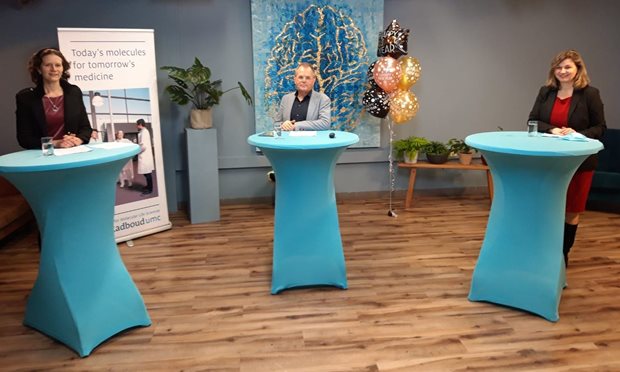
How do people with reduced immunity, especially kidney patients, react to a COVID-19 vaccination? And how can patients with peripheral arterial disease be helped by DNA testing? Two different studies at the Radboudumc will try to find answers to these two questions. These studies are made possible by ZonMw.
COVID-19 vaccination in people with impaired immune system
Researchers Renate van der Molen, theme Inflammatory diseases and Dimitri Diavatopoulos, theme Infectious diseases and global health and Marije Baas and Luuk Hilbrands, both theme Renal disorders are going to collaborate with all the Dutch umc's to study the safety and efficacy of the corona vaccine for people with impaired immune system. ZonMw has made a sum of 3.2 million euros available for this. The study in which the Radboudumc participates, the RECOVAC study (led by UMC Groningen), looks at kidney patients. For them, COVID-19 is extra dangerous and an effective and safe vaccine is of great importance. Vaccine developers' clinical trials have almost never not included patients with severe renal failure and transplant patients. Therefore, two issues are now being investigated. Firstly, the immune system response and the clinical course after vaccination in patients with severe kidney damage (kidney function less than 30 percent), in dialysis patients and in kidney transplant patients. In addition, the long-term efficacy and side effects of the vaccines in a group of dialysis and kidney transplant patients will be investigated.
Better prescription of blood thinners based on DNA research in patients with peripheral arterial vascular disease
Physician-researchers and PhD candidates Loes Willems and Josephine Kranendonk will initiate the GENPAD study together with vascular and transplant surgeon Michiel Warlé, also principal investigator. For the GENPAD study, they have received a grant of 600K euros from ZonMw. The GENPAD study is a study into better prescription of blood thinners on the basis of DNA research in patients with peripheral arterial disease (arteriosclerosis of the legs). Peripheral arterial vascular disease increases the risk of heart attack, stroke and other cardiovascular diseases. To prevent these complications as much as possible, patients are routinely prescribed a blood thinner, the drug Clopidogrel. In patients with certain DNA changes, Clopidogrel works less well. The GENPAD study will see whether patients suffer fewer complications if the treatment with the blood thinner is adapted to the results of the patient's DNA test. Should this treatment lead to better results, the study will also look at whether this method is cost-effective. This will possibly lead to changes in the current guidelines.
Related news items

Grants for heart and kidney research Two awards to Radboudumc in Open Competition ENW-XS
21 July 2022Two researchers from the Radboudumc receive a grant from the NWO within the Open Competition of the Exact and Natural Sciences. They are Thijs Eijsvogels, who studies the heart, and Pieter Leermakers, who studies the kidneys.
read more
Grants for research on magnesium deficiency and malaria Vidis for Felix Hol and Jeroen de Baaij
1 July 2022 Radboudumc researchers Jeroen de Baaij and Felix Hol both receive an NWO Vidi grant for their research, respectively on magnesium deficiency in type 2 diabetes and on malaria. read more
RIMLS awards call for nominations
19 October 2021 RIMLS awards several prizes to stimulate and honor our (young) researchers. Upcoming awards are Supervisor of the Year, Best Master Thesis, Best Publication, Best Image and more. Send your nominations now before 24 November 2021. read more

RIMLS online award ceremony proudly presenting the winners
13 January 2021In this special webinar of the RIMLS New Year Celebration, scientific director René Bindels reviewed 2020 and looked forward to 2021. But more importantly a number of researchers received prizes in the traditional RIMLS awards ceremony.
read more
RIMLS awards festival Twelve winners
16 January 2019 In 5 categories RIMLS young researchers received an award and bonus during the New Year's drinks. See all photo's. read more
